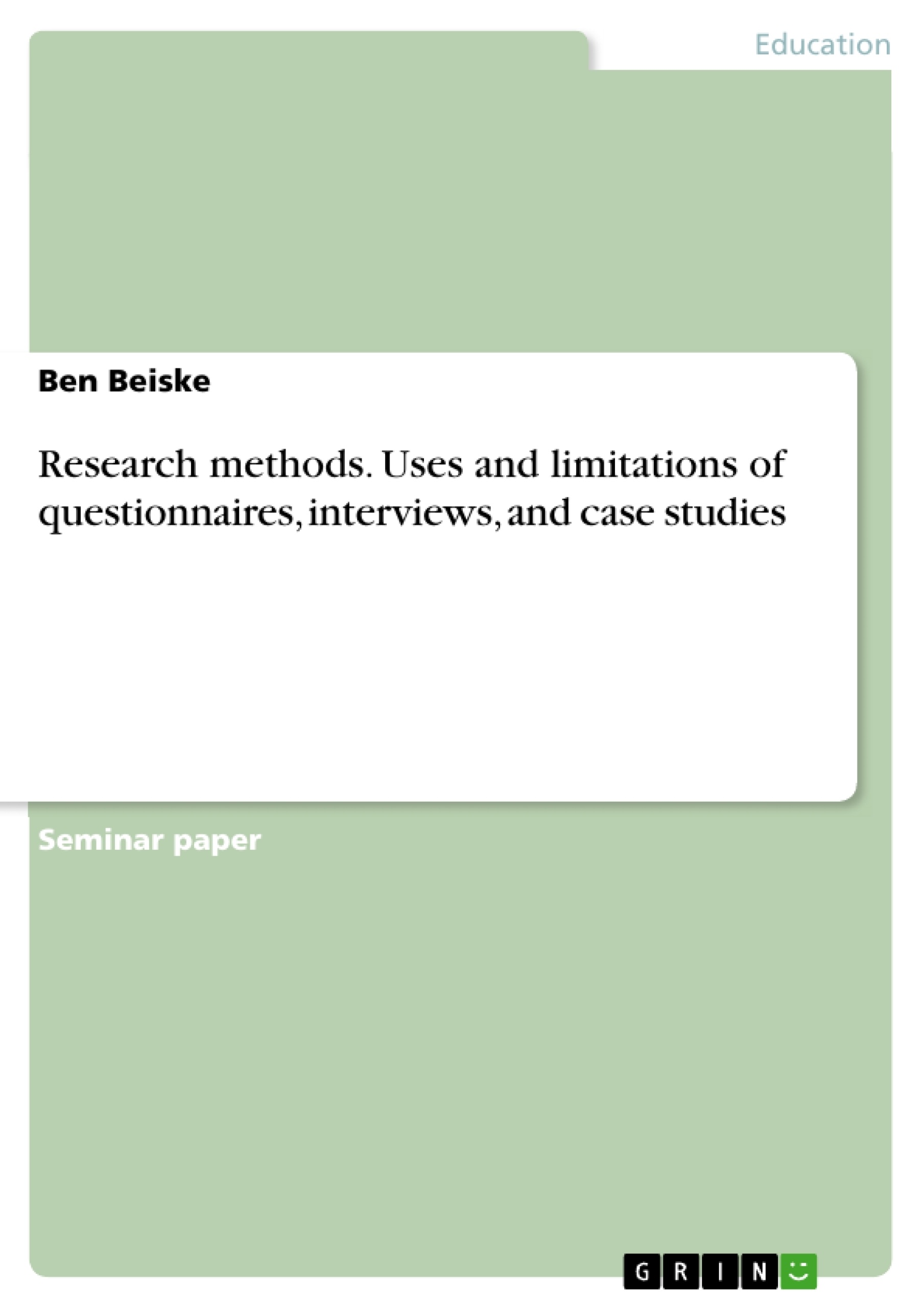At the beginning of any type of research, it is paramount for the researcher to determine the most appropriate methodology to carry out the study. While factors such as time and costs certainly play an important part in deciding how to approach a particular research problem, the subject of the research itself should ultimately determine the methods used. A good researcher will evaluate all available options prior to making a decision as to which methods to adapt in the light of being the most useful for the study at hand.
This paper will focus on describing a variety of methods, namely questionnaires, interviews, and case studies. Each chapter will give a brief introduction about the method, and then highlight the main strengths and limitations of each approach. Attention is also given to induction, which is defined as a data-driven approach to research, while deduction is seen as theory-driven. As such, the notion of data-driven versus theory-driven will be explored briefly for each method.
Table of Contents
- 1 INTRODUCTION
- 2 QUESTIONNAIRE
- 2.1 STRENGTHS
- 2.2 LIMITATIONS
- 3 INTERVIEW
- 3.1 STRENGTHS
- 3.2 LIMITATIONS
- 4 CASE STUDY
- 4.1 STRENGTHS
- 4.2 LIMITATIONS
- 5 CONCLUSION
Objectives and Key Themes
This paper aims to analyze the strengths and limitations of questionnaires, interviews, and case studies as research methods. It explores the suitability of each method for different research problems, considering factors like the research question, data-driven versus theory-driven approaches, and practical considerations.
- Strengths and limitations of questionnaires
- Strengths and limitations of interviews
- Strengths and limitations of case studies
- Inductive versus deductive approaches in research
- Choosing appropriate research methodologies
Chapter Summaries
1 Introduction: This introductory chapter establishes the importance of selecting appropriate research methodologies. It emphasizes that the research question should guide the choice of method, acknowledging the influence of factors like time and cost. The chapter introduces the three research methods—questionnaires, interviews, and case studies—that will be examined in detail, defining induction as a data-driven approach and deduction as a theory-driven approach. It highlights the importance of choosing the right research method to achieve valuable and meaningful results, particularly in management studies.
2 Questionnaire: This chapter defines a questionnaire as a structured technique for collecting primary data, typically a series of written questions. It discusses the importance of careful questionnaire design to elicit accurate and complete information from respondents. The chapter explores the use of questionnaires in both inductive (using open-ended questions to explore a topic) and deductive (using closed-ended questions to test existing theory) research approaches. Different question types, such as open-ended and dichotomous (closed-ended) questions, and their respective advantages and disadvantages are also explained.
Keywords
Research methods, questionnaires, interviews, case studies, strengths, limitations, inductive, deductive, primary data, qualitative research, quantitative research, methodology, management studies.
Frequently Asked Questions: A Comprehensive Language Preview
What is this document about?
This document provides a comprehensive preview of a research paper analyzing the strengths and limitations of three key research methods: questionnaires, interviews, and case studies. It covers the objectives, key themes, chapter summaries, and keywords of the full paper.
What research methods are discussed?
The paper focuses on questionnaires, interviews, and case studies, examining their individual strengths and weaknesses in detail.
What are the key themes explored in the paper?
The key themes include the strengths and limitations of each research method (questionnaires, interviews, and case studies), the suitability of each method for different research problems, inductive versus deductive research approaches, and the overall process of choosing appropriate research methodologies for effective research.
What is the objective of the research paper?
The main objective is to analyze the strengths and limitations of questionnaires, interviews, and case studies as research methods, considering their suitability for different research questions and approaches (data-driven vs. theory-driven).
What are the chapter summaries?
Chapter 1 (Introduction): This chapter emphasizes the importance of selecting appropriate research methodologies based on the research question, time constraints, and costs. It introduces questionnaires, interviews, and case studies, defining inductive and deductive research approaches.
Chapter 2 (Questionnaire): This chapter defines questionnaires and their role in collecting primary data. It explores the importance of careful questionnaire design, and discusses both inductive (open-ended questions) and deductive (closed-ended questions) approaches within questionnaire design, along with the advantages and disadvantages of different question types.
Chapter 3 (Interview): This chapter (not fully detailed in the preview) will likely delve into the strengths and limitations of interviews as a research method.
Chapter 4 (Case Study): This chapter (not fully detailed in the preview) will likely delve into the strengths and limitations of case studies as a research method.
Chapter 5 (Conclusion): This chapter (not fully detailed in the preview) will summarize the findings and offer concluding remarks on the use of the three research methods.
What are the keywords associated with this research paper?
Keywords include: Research methods, questionnaires, interviews, case studies, strengths, limitations, inductive, deductive, primary data, qualitative research, quantitative research, methodology, management studies.
What is the difference between inductive and deductive approaches?
The paper distinguishes between inductive (data-driven) and deductive (theory-driven) approaches to research. Inductive approaches start with data and develop theories, while deductive approaches start with a theory and test it with data.
What types of questions are discussed in relation to questionnaires?
The preview mentions open-ended and dichotomous (closed-ended) questions as examples of question types used in questionnaires, along with their respective pros and cons.
For whom is this research relevant?
This research is particularly relevant for those conducting research in management studies and other fields where the selection of appropriate research methodologies is critical.
- Quote paper
- Ben Beiske (Author), 2002, Research methods. Uses and limitations of questionnaires, interviews, and case studies, Munich, GRIN Verlag, https://www.grin.com/document/15458




